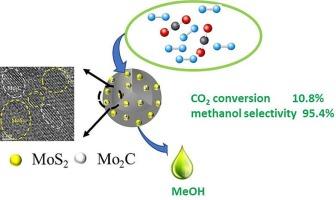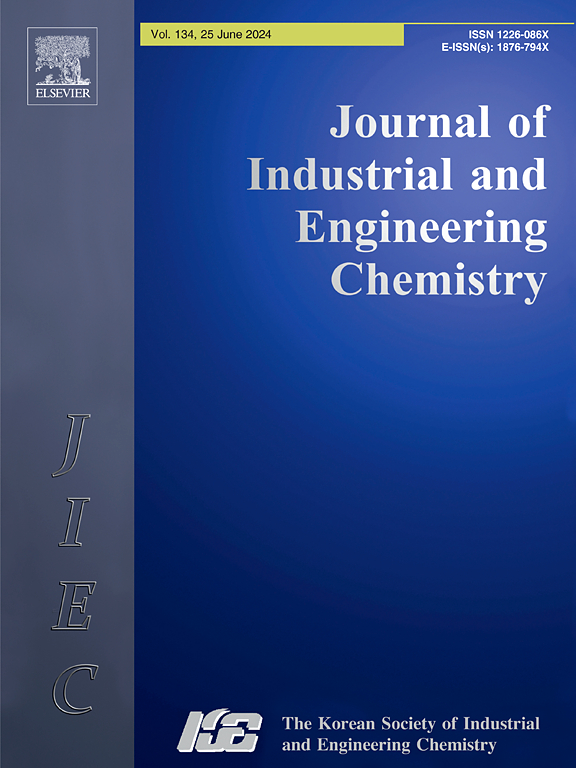Constructing Mo2C/MoS2 heterojunction nanostructure as outstanding catalysts for CO2 hydrogenation
IF 5.9
3区 工程技术
Q1 CHEMISTRY, MULTIDISCIPLINARY
Journal of Industrial and Engineering Chemistry
Pub Date : 2025-05-12
DOI:10.1016/j.jiec.2025.05.019
引用次数: 0
Abstract
The utilization of CO2 to produce clean energy has become an inevitable trend in the global energy sector. Methanol, as an efficient energy storage chemical and a promising future alternative fuel, can be synthesized through the CO2 hydrogenation with green hydrogen. In this work, Mo2C/MoS2-T catalysts with heterojunction nanostructures were synthesized using a surface carbonization strategy. The influence of carbonization temperature on the structural and morphological properties of the catalysts was systematically examined, with subsequent evaluation of their catalytic performance for synthesizing methanol from CO2 hydrogenation. In situ diffuse reflectance infrared Fourier transform spectroscopy experiments revealed the coexistence of both formate route and CO route during CO2 hydrogenation over the Mo2C/MoS2-T catalysts. Under the optimal reaction conditions, the Mo2C/MoS2-800 catalyst presented exceptional catalytic performance, achieving a 10.8 % conversion of CO2 with a 95.4 % selectivity of methanol. Furthermore, the catalyst demonstrated exceptional long-term stability, maintaining consistent catalytic activity without noticeable deactivation during 150 h of continuous operation. This study establishes a straightforward yet effective strategy for the rational design of high-performance MoS2-based catalysts, providing significant potential for industrial applications in CO2 hydrogenation to methanol production.

构建Mo2C/MoS2异质结纳米结构作为CO2加氢催化剂
利用二氧化碳生产清洁能源已成为全球能源领域的必然趋势。甲醇是一种高效的储能化学品,是一种很有发展前景的替代燃料。本文采用表面碳化的方法合成了具有异质结纳米结构的Mo2C/MoS2-T催化剂。系统考察了碳化温度对催化剂结构和形态性能的影响,并对其催化CO2加氢合成甲醇的性能进行了评价。原位漫反射红外傅立叶变换光谱实验表明,在Mo2C/MoS2-T催化剂上,CO2加氢过程中甲酸路线和CO路线共存。在最佳反应条件下,Mo2C/MoS2-800催化剂表现出优异的催化性能,CO2转化率为10.8%,甲醇选择性为95.4%。此外,该催化剂表现出优异的长期稳定性,在连续运行150小时内保持稳定的催化活性而没有明显的失活。该研究为合理设计高性能二硫化钼催化剂建立了一个简单而有效的策略,为二氧化碳加氢制甲醇的工业应用提供了巨大的潜力。
本文章由计算机程序翻译,如有差异,请以英文原文为准。
求助全文
约1分钟内获得全文
求助全文
来源期刊
CiteScore
10.40
自引率
6.60%
发文量
639
审稿时长
29 days
期刊介绍:
Journal of Industrial and Engineering Chemistry is published monthly in English by the Korean Society of Industrial and Engineering Chemistry. JIEC brings together multidisciplinary interests in one journal and is to disseminate information on all aspects of research and development in industrial and engineering chemistry. Contributions in the form of research articles, short communications, notes and reviews are considered for publication. The editors welcome original contributions that have not been and are not to be published elsewhere. Instruction to authors and a manuscript submissions form are printed at the end of each issue. Bulk reprints of individual articles can be ordered. This publication is partially supported by Korea Research Foundation and the Korean Federation of Science and Technology Societies.

 求助内容:
求助内容: 应助结果提醒方式:
应助结果提醒方式:


